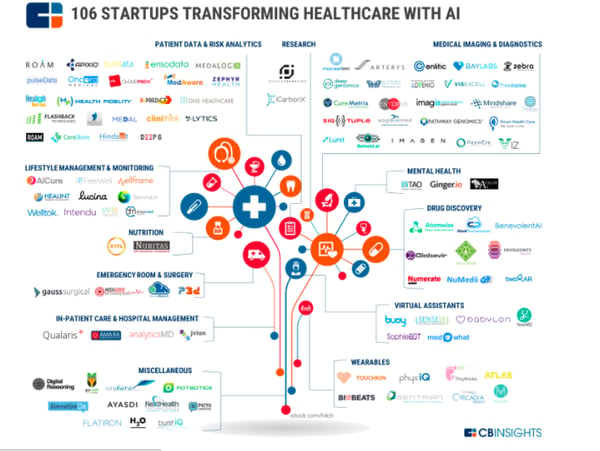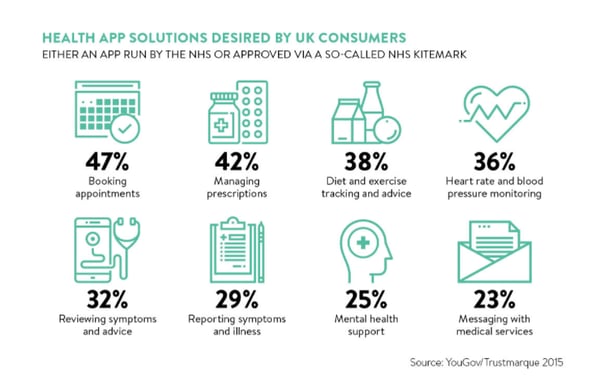
You really want Machine Learning in your healthcare app


The shape of today’s tech sector is highly influenced by Machine Learning, Big Data, robotics and Artificial Intelligence. Healthcare seems to catch up really fast, introducing advances in diagnosing, treating and monitoring health issues, both physical and mental ones. These advances went as far as to give birth to neurorobotics (a combination of neuroscience, AI, and robotics) and to fuse the digital and biological worlds. Healthcare and life science are also sectors with the highest demand for Machine Learning as a Service (MLaaS), which is used mainly for integrating data in these areas.
Only in 2016 deals to AI in healthcare startups hit 88, with two new unicorns emerging in the space: China-based iCarbonX and oncology-focused Flatiron Health. In 2017, the number of AI healthcare startups is reaching a 6-year-high, and is still prognosed to increase. With so much money pumped into AI solutions for healthcare, the sector keeps the position of the top industry for AI deals.

Diagnosis and detection
Machine learning algorithms are able to spot early indicators of diseases, which happen to be unnoticed by doctors on the first stage. ML solutions analyse piles of data in seconds, and figure out links between certain facts/health conditions, facilitating doctor’s work and creating grounds for precise early diagnosis and custom treatment.
Just a few years ago we saw IBM Watson being tested in the form of iPad app by Westmed Medical Group in New York. Watson was analysing patients’ data, figuring out the cause of their cancer and even providing custom estimates of the effectiveness of particular treatment method for each patient. At the beginning of 2017, AI forces were used to identify tuberculosis on chest X-rays, help doctors detect intracranial bleeding in patients with head trauma and stroke, utilise Watson technology for looking over medical data and marking the risk of aortic stenosis in patients, or assist spine surgeons, helping them to create personalised implants.
The spectrum and pace of healthcare AI advances is so considerable, that it brings up speculations about artificial intelligence replacing doctors some day. While the vision of never-tired, never-hungry caregivers is more than tempting, at HIMSS 2017, IBM CEO Ginni Rometty made an official statement that these advances are to augment human intelligence, and definitely not replace it. The potential is also noticed by doctors, who usually choose to empower their professional efforts with AI, rather than consider the technology a personal threat. The trust in Artificial Intelligence assisting professionals seems exceptionally strong, given that 35% of surveyed hospitals plan to leverage AI within 2 years, and more than 50% of them within 5.
Machine Learning solutions are not only a domain of complex devices and programmes used in hospitals by qualified professionals. Except for redefining institutional healthcare, Machine Learning opens the door for facilitating pre-doctoral phase of infections and diseases as well as after-treatment health monitoring. The first category introduces virtual health assistants (chat-bots), which are the healthcare version of Siri or Alexa- intelligent personal assistants (IPAs) supported by AI.
Virtual assistants
- Hi Ben, how can I help you?- I’ve got a slight headache and small shivers. What could it be?
- What is your temperature, Ben?
- It’s 37,5C.
- Do you have any other symptoms?
- No, not really…
- Well, while shivers and headache are new symptoms, your body temperature had been above average also last week. This may be the early state of infection — I recommend you to visit your paediatrician. Shall I call your doctor’s office and book an appointment?
Today such scene is very far from a science-fiction sphere. Imagine your Siri analyses the data from Health app, interprets them and, if asked, schedules your doctoral visit, sends the data to the doctoral database and tells you how to care for yourself while waiting for your appointment. Sounds neat?
Except for instant advice before the doctoral visit, there are also a lot of basic medical questions, which do not require the full attention of a physician, but leaving them unanswered makes us nervous and clueless. This is why the idea of personal health assistants on our mobiles suddenly becomes definite response for certain patients’ need — a quick information, instant advice, ability to estimate your symptoms in a bigger context.
But the potential of virtual assistants is way bigger than that. If these handy health advisors become a part of our daily life, they could report the symptoms of illness, helping us to take up some prevention, or manage our prescriptions, minimising the risk of incorrect use of medication, which harms at least 1.5 million patients per year, mostly seniors).
Do users want health advisory apps?
Yes, they very much do. According to the research made among UK citizens in 2015, the expectations and visions on how would they benefit from the health app are pretty varied. These concepts got segregated into 8 categories, each of them representing the needs of 47% max. — 23% min. Of UK’s society.

Now, imagine combining these ideas with intelligent bot armed with speech recognition algorithms.That wouldn’t even require you to open an app and type anything.
Is user confused with his symptoms?
Did he forget his body temperature from yesterday?
No need to worry, the app could actually figure it all out for him. And all it would take is just a small talk with an intelligent assistant, that would do the rest of work.
“The [healthcare] industry is ripe for change. We think there is tremendous potential to do on-device computing, to do cloud computing as well, and to take that learning through machine learning, deep learning and ultimately artificial intelligence, [to] change the way health[care] is delivered”- assumes Jeff Williams, COO at Apple.
Health Monitoring
AI solutions may assist patients before, during and also after their doctoral appointment or hospital visit. That means even after the diagnosis is given, patients could still keep on monitoring their health concerns e.g. to estimate the effectiveness of their medicines, manage prescriptions, track their dieting progress, get alarmed if their organism reaction indicates health issues (e.g. anaphylactic shock caused by some new diet component). Such information may obviously be used and taken into consideration during another doctoral visit, which closes the circle of health maintenance process. This could be all within reach, right there in our pockets, available on our mobile phones. And these are still just a few examples of how AI technology may be utilised in healthcare.
Wrap up
The adoption of Artificial Intelligence in healthcare is on the rise, as it is solving a variety of problems for patients, medical institutions and the healthcare industry overall. The horizon for the industry in the next years is widening, and AI research for healthcare is in bigger demand than anytime before. At the same time, the technology is the top interest of both investors pumping capital in healthcare solutions, and the patients, eager to get some early awareness and data-based insights.
